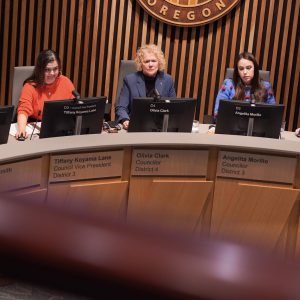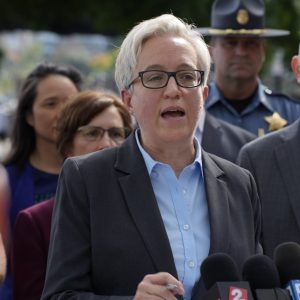Oregon Governor Tina Kotek has called a special session of the legislature to pass transportation funding legislation. In a statement released today, Kotek said the session will begin August 29th and lawmakers will work, “to pay for basic road maintenance and operations at ODOT, as well as address funding needs for local governments and transit districts.”
Along with the special session announcement, ODOT Director Kris Strickler told members of an employee union today that the effective date for layoffs has been pushed from July 31st to September 15th. Strickler received a letter from Governor Kotek on Monday stating that she’d been assured by legislative leaders that they’d fund the extension. “The commitment from legislative leaders to provide resources for this postponement should be taken for what it is,” Kotek wrote to Strickler. “A thin, timebound safety net to make sure that additional costs generated through the delay will not lead to deeper cuts in the second wave of reductions.”
The employment extension increases pressure on lawmakers to pass a funding package. In an email to staff sent today by Director Strickler, he wrote, “I’m heartened to see that a safety net has been proposed,” but added that, “a postponement will require the agency to incur additional costs for which we don’t have funds to cover.”
Today’s news means pending layoffs are halted and ODOT can maintain operation of 12 maintenance facilities that were prepping for closure.
The Governor gave only a few hints at what the new funding package will include. Rumors have swirled that it would be a basic six-cent gas tax increase aimed at staving off job cuts at ODOT and giving cities and counties a minimum handout from the State Highway Fund. But Kotek seems to have crafted a package that goes beyond that. The statement from her office released today says, “Her goal is to forestall immediate impacts to transit service through increasing the amount of funding available to the Statewide Transportation Improvement Fund (STIF).”
In addition to what sounds like an increase to the payroll tax that funds the STIF, the statement also said Kotek wants the package to include, “provisions related to ratepayer fairness, funding reliability, and agency accountability.”
Given how the regular session ended, it will be interesting to see how Kotek and Democratic leaders pull this off. The one thing that’s changed since sine die is the ratcheting-up of pressure on lawmakers from voters in their districts to save ODOT jobs and preserve basic road safety.
Whether that’s enough to overcome a deeply polarized legislature remains to be seen.
UPDATE, 7/23 at 1:00 pm: Various outlets are reporting that Governor Kotek has unveiled more details about the package she and legislative leaders will try to pass in the special session. According to The Oregonian:
Kotek is proposing that lawmakers raise the state’s 40 cents per gallon gas tax by 6 cents, increase car registration fees by $42, hike title fees by $139, implement a new $30 fee for electric vehicle users and double the state’s 0.1% payroll tax for transit.
The funding plan would provide just enough money to allow the state transportation agency to pay its bills and help local governments and public transit providers maintain their current service levels, Kotek said. Its proposed tax and fee hikes are lower than those included in comprehensive funding plans that Democrats proposed during the five-month session that would have boosted transportation services statewide.
The proposal also calls for more frequent audits and increased legislative oversight of the state transportation agency…








Thanks for reading.
BikePortland has served this community with independent community journalism since 2005. We rely on subscriptions from readers like you to survive. Your financial support is vital in keeping this valuable resource alive and well.
Please subscribe today to strengthen and expand our work.
That means nothing for peds, cyclists, or the disabled outside of buses.
It’s a trap that Dems are setting for themselves. Just watch: ODOT’s megaprojects will go ahead, cars and trucks will roll on ever-wider and faster roads, and the rest of us will get NOTHING.
Is it a trap? Or is it simply that the Dems want the megaprojects with cars and trucks on ever wider and faster roads? I’m leaning towards this is simply what they want.
Local governments are where most ped/bike/ADA projects happen, so funding them will fund more of those kinds of projects.
At least some good news, after the Dems bungled this horribly in June. Whatever legislative leaders manage to pass, two critical elements absolutely must be included:
1) Add an automatic annual inflation adjustment to any gas-tax increase for future years. The awful GOP-created 60% requirement to raise any revenue (the basic business of governing) is an unfair and nearly impossible burden. An inflation adjustment will depoliticize this issue in the future–similar to the minimum wage–avoiding the need for constant battles just to maintain our roads.
2) A major increase in the payroll tax for public transit. This is essential. Let’s hope they can get it passed.
Also, Rep. Mark Meek really needs a progressive primary challenger in 2026. He’s a Republican in Democrat clothing.
Givenhow poorly the city, county and state have performed under progressives, I’m not sure that’s a sane suggestion.
Lord help me, if new taxes didn’t take a supermajority we’d be the grifting non-profit, low growth, bloated bureaucracy, preachy greedy lawyer capital of the USA.
WashCo and MultCo people don’t ask a lot of questions because they place axiomatic trust in the great blue tax god to make life better through taking more money from the public and spending it on—who cares? It’s the thought that counts toward your proving that you care.
Have you ever lived anywhere else? I’m guessing not, cuz if you had, you’d know that Oregonians pay next to nothing in taxes. My property tax bill in New York was over 2X my *total* Oregon tax bill. Yes, our income tax is a little high but that’s only to make up for the fact we pay no sales tax.
Oregonians are now conditioned to pay almost nothing but expect concierge service. It’s impossible. The state will become unlivable unless we start paying for the services we expect.
Thanks, Fred. Due to the GOP-instituted Measures 5, 47, and 50 in the 1990s, funding for schools, roads, and other basic public services in our state has been absolutely gutted. OR has gone from middle of the pack to nearly the bottom in most categories. The corporate share of taxation has plummeted too. Most Oregonians aren’t fully aware of this history.
As Jonathan has shown in previous posts, funding for transportation in Oregon is the lowest per capita of any Western state–by far. The GOP has literally NO answer for the real problems facing our transportation system (not to mention our climate). Their cynical stance–to cut, cut, cut, just build roads, and no money at all for public transit or safety–is, frankly, nonsensical and archaic. To paraphrase Justice Oliver Wendell Holmes, taxes are the price we pay to live in a civilized society.
Of the data I was able to find, we spend on transportation about $1,240 per capita, which is about on par with Idaho, Montana and Utah and less than California, Washington, and Nevada. The actual problem though is that Oregon collects $6,920 per capita in total taxes. When compared to the other western states and the relative cost of living for each state, Oregon is 3rd/4th (depending on inclusion of CO).
I am pretty sure that Arizona, Utah, Montana, Nevada, and Idaho are all civilized societies, they consistently rank as some of the best places to live (so does Oregon) and they provide that at a lower cost to their constituents.
The gut instinct to taxpayers, particularly those that are enjoying a majority of the burden, that there is adequate capital in the system but it is really an issue of allocation, appears to be about right.
No, see, you don’t understand, Democrats will just take all of your money given half a chance and are too stupid to realize that they’d obviously be punished at the ballot box for large tax increases. And Portland has never voted down a tax increase or levy. Taxes bad! Now hurry up and hire more police to chase down speeders and get homeless people off of my front lawn!
/s
The GDP per capita of NY is 65% higher than Oregon. The total GDP of NY is 7x Oregon’s. There are 49 Fortune 500 companies in NY, there are two here. This might have something to do with the tax structures there.
The second part is spot on though, most Oregonians pay literally nothing in actual taxes net of transfers, which may be part of the problem here, this place is just continually more dependent on the people making higher wages and then those same people are derided in the media for not paying their fair share.
For the sake of comparison:
Net fiscal contribution by quintile in Oregon:
Bottom 20%: -38% to -48%
Second 20%: -5% to -15%
Middle 20%: -0.3% to -5%
Fourth 20%: +5% to +8%
Top 20%: +8% to +10%
I don’t know much, but when 60% of the population doesn’t actually contribute anything, how capital is allocated in the system is probably more of the problem than actual capital in the system.
What a ridiculous apples-to-oranges comparison! The lack of Fortune 500 companies in Oregon means what? – that Oregonians can afford only dirt roads for horses and buggies? By your logic, the 49 F-500 companies in NY would mean New Yorkers pay no taxes at all. There’s plenty of money in Oregon to support transportation, but taxpayers have gotten used to getting a free ride.
Seriously? Is this news to you? Do you think there is no value to having large stable employers, particularly a number of them from diversified industries? Can you not imagine that there are people who would want to work for these companies? Maybe there are governments that would like to tax the companies and employees and can do so at a rate that is higher than a place that doesn’t have those companies? Are you surprised that the quality of life in New York and Louisiana are different?
To be sure, around half of Oregon’s elected Democrats are what would have been called “moderate Republicans” 20-30 years ago…
This should be the final blow for the I5 widening project. It will be extremely disappointing if any funding for that comes from this. Hopefully they focus on funding in the short term and then can work on a larger package in a future session
From Mahonia Hall on down you’ve got the same people in the same deck chairs. Kotek will have a sharp eye on the special session. If federal cuts didn’t kill the boondoggles already, we’re stuck.
If there was any appetite for change that ‘Oops our budget is out by $1 Billion’ hilarity would have brought it on. How can you manage billion dollar projects if that is also the over/under in your accounts?
ODOT is like a bike shop with no wrenches, they just finger tighten everything and put it out on the floor.
I help run a community bike shop and we get a lot of used bikes from other shops where everything is barely on the bike about finger-tight – perhaps their mechanics were trained at the ODOT Bike Institute in Salem?
Wow! For years people commenting on this blog have beseeched government to impose user fees on drivers. A gas tax, according to the laws of economics should discourage driving. Now the tone of commentary is deriding Oregon’s government for beginning to start commencing discussions about driver disincentives.
I think there is significant support for increasing the gas tax among the BP commentariat. I certainly support it. I support some kind of EV per mile tax, too (either the half-baked scheme that’s been piloted for like a decade or something that actually works).
Here in NC we have a 2% sales tax on food that is spent exclusively on interstate freeway construction – no joke, I’m not kidding. Would Oregonians (and BP readers) support a similar tax? Or would you prefer an indirect sales tax on large business sales like your local PCEF, but statewide?
I’m fairly agnostic on taxation mechanisms — I tend to disfavor sales taxes relative to more progressive schemes. I’m a little wary of schemes that specifically try to soak ‘the rich’ or ‘big business’, because I think such setups invite gaming the system and are likely to be and appear unfair to important parts of society. I’d rather have broad tax schemes that are mildly progressive — everybody pays, but the rich pay more.
Having said that, many will claim the gas tax is regressive. I strongly support raising the gas tax (and other taxes on direct emissions–especially air travel), because such taxes create a market incentive to find ways to organize society with lower emissions. I think politically astute state level democrats could divide the republicans by offering personal and business income tax ‘relief’ paired with substantial carbon taxes. That would force the republicans to choose between their up- and downscale constituencies instead of just watching democrats destroy their own coalition.
Obviously I do not want to see special taxes for road construction, and I do not want to see large scale freeway expansions built in OR.
On the emissions front, it would be much more efficient to have a broad based carbon tax, rather than trying to play whack-a-mole with targeting particular products or sectors. If you emit a ton of CO2e, you should pay >$80 to society for the privilege, regardless if that emission comes from driving a truck, mixing some concrete, or cutting down a forest.
A gas-specific tax should rather be targeted to controlling congestion and paying for the public infrastructure required to move automobiles around. Though, given the advent of electric vehicles increasingly displacing petroleum vehicles, it’s perhaps better to shift from a gas tax to a weight-mile tax along with flat title/registration fees, as that scheme would better represent the actual marginal cost of somebody buying a car and driving that car a mile on the road and avoids the weird effects of the owners of comparatively light, older, and less efficient petroleum vehicles subsidizing the owners of heavy, new, ultra efficient hybrid and electric vehicles.
How exactly would you implement a ‘broad based carbon tax’? There’s no single point to levy a tax. The best I can think of doing is playing whack-a-mole by taxing significantly emitting activities. And fossil fuel consumption is a big and easy emission source to tax. The gas tax is one part of this. I agree we should also tax concrete and all other big emission sources.
A $30 fee for EVs?! You’ve gotta be kidding me. Owners of gasoline-powered cars pay that much in a couple tanks.
EV owners continue not paying their fair share.
That’s a awfully big rig those “gasoline-powered” car owners are driving…
EVa should continue not paying their “fair share” until we’ve gone much further in getting rid of fossil fueled vehicles.
Does anyone actually care about climate change anymore?